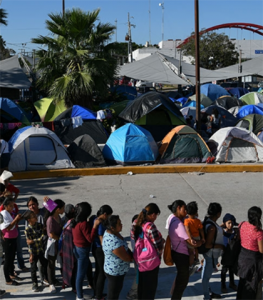US ‘outsources’ refugee program
The US Government has effectively ‘outsourced’ some of its refugee program by quietly asking six humanitarian groups to recommend which migrants should be allowed to stay in the US instead of being deported under rules brought in because of the COVID-19 pandemic that block people from seeking asylum.
The move came as large numbers of people are crossing the US’ southern border and as the US Government faces increasing pressure to lift the public health powers instituted by former Trump administration and kept in place by President Joe Biden.
 The groups will determine the most vulnerable asylum seekers with the US government aiming to admit to the country up to 250 asylum-seekers a day.
The groups will determine the most vulnerable asylum seekers with the US government aiming to admit to the country up to 250 asylum-seekers a day.
The six groups have agreeing to be part of the scheme until July 31 by when, the consortium hopes the Biden administration will have lifted the public health rules.
The groups have not been officially identified but reports in the US say they are: International Rescue Committee, a New York-based global relief organisation; London-based Save the Children; two US-based organisations, HIAS and Kids in Need of Defense; and, two Mexico-based organisations, Asylum Access and the Institute for Women in Migration.
A similar but separate mechanism led by the American Civil Liberties Union began in late March and allows 35 families a day into the United States at places along the border. It has no end date.
The US Government has signalled it is looking to replace the current arrangements.
“As the United States continues to enforce the CDC Order under its Title 42 public health authority, we are working to streamline a system for identifying and lawfully processing particularly vulnerable individuals who warrant humanitarian exceptions under the order,” a U.S. Department of Homeland Security spokesperson said.
“This humanitarian exception process involves close coordination with international and non-governmental organizations in Mexico.”
But critics say the selection processes give too much power to a small groups of organisations and that the scheme is shrouded in secrecy without a clear explanation of how the groups were chosen.
They say there are also no assurances that the most vulnerable or deserving migrants will be chosen to seek asylum.
The six organisations are reported to be concerned that that going public may cause their offices in Mexico to be mobbed by asylum-seekers, overwhelming their tiny staffs and exposing them to threats.
The consortium was formed after the US Government asked the UNHCR office in Mexico for the names of organizations with deep experience and capacity in Mexico.
“We’ve had long relationships with them and they’re trusted partners,” a UNHCR statement said.












